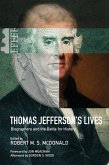People, get ready!
Thomas Jefferson lived a very successful, accomplished life and was one of the most intelligent of the Founding Fathers. He is probably most remembered as the principal author of the Declaration of Independence. Jefferson served as the governor of Virginia, congressman, the first secretary of state under George Washington, vice president under John Adams, and president of the United States from 1801 to 1809. He was also a diplomat, lawyer, architect and could speak several languages.
As president, he signed the congressional Act Prohibiting Importation of Slaves and was a big advocate for religious freedom. Thomas Jefferson thought highly of the Bible and made frequent use of its references and passages. He was a Bible enthusiast and often gave Bibles as gifts to family members.
Jefferson's greatest gift may not have been his work on the Declaration of Independence but one that he called his "wee little book."
He took on a project to collect the best and most concise moral teachings known. After a lengthy search, he found them in Jesus's teaching as recorded in the Gospels, which Jefferson believed were the most sublime and benevolent code of morals ever offered to man.
Finally, after several years of planning, in 1820 and at age seventy-seven, he finished construction of his book by cutting excerpts from the Gospels of the New Testament and arranging them in chronological and topical order covering the story of Jesus's life, parables, and moral teaching. The work did include miracles and the supernatural such as heaven, hell, angels, devil, eternal life, and more. Jefferson's purpose was to clarify Jesus's major teachings into one short collection for his own nightly study.
If there's anything the world needs today, it's the fulfillment of the Great Commission--to go and tell all the world about the teachings of the Lord Jesus Christ, including his life, teachings, sufferings, crucifixion, and resurrection.
Jefferson's work was a priceless nightly study then and a priceless nightly study now.
Thomas Jefferson lived a very successful, accomplished life and was one of the most intelligent of the Founding Fathers. He is probably most remembered as the principal author of the Declaration of Independence. Jefferson served as the governor of Virginia, congressman, the first secretary of state under George Washington, vice president under John Adams, and president of the United States from 1801 to 1809. He was also a diplomat, lawyer, architect and could speak several languages.
As president, he signed the congressional Act Prohibiting Importation of Slaves and was a big advocate for religious freedom. Thomas Jefferson thought highly of the Bible and made frequent use of its references and passages. He was a Bible enthusiast and often gave Bibles as gifts to family members.
Jefferson's greatest gift may not have been his work on the Declaration of Independence but one that he called his "wee little book."
He took on a project to collect the best and most concise moral teachings known. After a lengthy search, he found them in Jesus's teaching as recorded in the Gospels, which Jefferson believed were the most sublime and benevolent code of morals ever offered to man.
Finally, after several years of planning, in 1820 and at age seventy-seven, he finished construction of his book by cutting excerpts from the Gospels of the New Testament and arranging them in chronological and topical order covering the story of Jesus's life, parables, and moral teaching. The work did include miracles and the supernatural such as heaven, hell, angels, devil, eternal life, and more. Jefferson's purpose was to clarify Jesus's major teachings into one short collection for his own nightly study.
If there's anything the world needs today, it's the fulfillment of the Great Commission--to go and tell all the world about the teachings of the Lord Jesus Christ, including his life, teachings, sufferings, crucifixion, and resurrection.
Jefferson's work was a priceless nightly study then and a priceless nightly study now.
Dieser Download kann aus rechtlichen Gründen nur mit Rechnungsadresse in A, D ausgeliefert werden.









